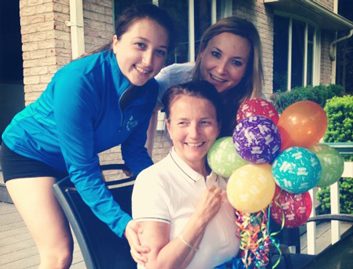How to Care for a Parent with Alzheimer’s
Alzheimer’s disease is affecting Canadians younger and younger. Read on for tips on coping as a caregiver

Eight years ago, Carolyn and Claire Poirier first started noticing some strange behaviours in their mom. Jane began forgetting where she’d parked her car, started driving on the wrong side of the road, and began having mood swings that were totally out of character.
It sounds like behaviours that someone quite elderly might exhibit ‘ but Jane was only in her early 50s.
In 2008, the Toronto family received the formal diagnosis for what was causing Jane’s strange behavior: Alzheimer’s disease.
‘There was some level of denial,’ recalls 25-year-old Carolyn. But the reality of the situation for her family began to set in as, over the years, Jane’s condition worsened.
Now, 61-year-old Jane needs full-time supervision and doesn’t remember any of her relationships ‘ including those with her husband and two daughters, who are now helping to care for their mom much earlier than they could ever have expected. And they’re not the only young women in this scenario.
The latest stats from the Alzheimer Society of Canada show that 50,000 Canadians aged 60 and younger have this disease, meaning more and more young women are becoming caregivers.
‘The prevalence is growing,’ says Dr. Larry Chambers, the Society’s scientific advisor. The early-onset form of the disease is more common now due to aging baby boomers, he explains.
Nowadays, the perception of Alzheimer’s as a disease impacting just the elderly isn’t accurate, Carolyn adds. ‘The reality is this disease will affect more and more 50-year-olds every day,’ she says. ‘And therefore it will affect more and more 20-year-olds.’
Caring for a sick parent is a daunting task for anyone ‘ but can be particularly unexpected for someone young. We’ve got some tips for coping and thriving as a young caregiver just in time for the 3rd annual World Alzheimer’s Month.
1. Educate yourself
Marija Padjen, chief program officer at the Alzheimer Society of Toronto, says it’s crucial to increase your knowledge about what your parent is facing. ‘You feel more in control,’ she explains. ‘You’re not sitting back and waiting for things to happen.’ She recommends checking out the Alzheimer Society of Canada‘s website for starters to gain more insight into the disease.
2. Get support
If you’re helping care for a parent with Alzheimer’s, a support system is important.
‘You have to have one, no matter what it is, whether it’s your family or your friends,’ says Carolyn.
‘Nobody can do this alone,’ echoes Marija.
Local chapters of the Alzheimer Society have counselling and support groups, including ones geared specifically towards young caregivers.
3. Be open with others
It could be tempting to hide your parent’s diagnosis because you’re worried about how people will react. But ‘full disclosure is so important,’ says Carolyn.
If you’re not honest with your friends or coworkers, they might wonder why you’re cancelling on plans last minute or suddenly acting a bit more stressed.
‘Talking to them about this disease is so important,’ Carolyn says, adding that it’s crucial to educate people so they understand what it’s like coping with Alzheimer’s.
4. Give back
Carolyn and Claire have used their situation to start helping other young caregivers. The sisters are both team members with Memory Ball, an annual event in Toronto that was first held in 2011 to raise money for Alzheimer’s research and promote awareness of the disease among younger generations.
Carolyn says it’s been a rewarding experience, and encourages other young caregivers to find their own personal ways to raise awareness and give back.
‘You need to do something outside of work that has a purpose,’ she says.
5. Stay balanced
Don’t assume being a young caregiver means you have to give up doing the things you love.
You have to stay engaged through exercise and hobbies, says Carolyn. ‘Or you’d go crazy,’ adds 19-year-old Claire.
The sisters have found out first-hand that staying balanced is crucial to their own health and happiness, and it’s what their mom would want for them too.
Photo, from left to right: Claire, Jane and Carolyn on Jane’s birthday in May 2013.




